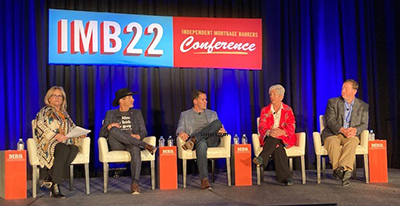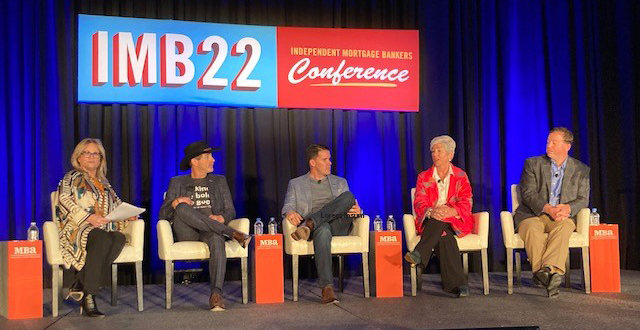
IMB Talks: Staying Ahead in the Mortgage Industry in 2022

NASHVILLE, Tenn.—You’ve heard of “TED Talks;” now, welcome to “IMB Talks.”
Here at the recent MBA Independent Mortgage Bankers Conference, several independent mortgage bankers took the stage to give their take on what’s happening in the mortgage banking industry—and challenges and opportunities facing IMBs in the months ahead.

Dave Sheeler, Executive Vice President, Freedom Mortgage Corp., Mt. Laurel, N.J.
“We’ve seen rapid rate increases in the past few months; the refi market has changed dramatically,” Sheeler said. “We’ve seen drops in production of roughly 60 percent; the whole market hasn’t dropped off like that, but the refi market is seeing big challenges.”
Freedom has “pulled back,” Sheeler said. “We’ve rightsized; we’ve looked at what we have to do to compete,” he said. “We’ve taken out all the ‘nice haves’ and changed to ‘need-haves.’ And it’s going to be quite some time before we see another drop in rates.”
The good news, Sheeler said, is that “we live in a great rate environment and we expect it to continue to be that way for the next several years.”
Sheeler said Freedom is also looking into the bulk market. “What we’re seeing today is record bulk transactions in the market—a tremendous amount of [mortgage servicing rights]. And whether it’s independent mortgage banks or others, we’re seeing a lot of interest and if it’s not a core part of your business, it might be a good time to start looking.”
Brent Chandler, Founder and CEO of FormFree, Athens, Ga.
Chandler envisions a future in which everyone has the ability to borrow. “The things that are preventing some people from getting loans today are possible if we use data the right way,” he said. “We can use data to be more inclusive.”
The common denominator in any loan is human, Chandler said. “I’m the denominator; I’m the risk,” he said. “If you don’t understand me, how can you make me a loan? Data allows us to get in the car, turn on the GPS and get where we want to go. We can learn about accidents to avoid certain routes. And data can get people into homes.”
Chandler noted there are currently 100 million renters. “Some of those people want to get into a home, but unfortunately, based on certain data, they can’t—they’re invisible, they’re underserved—there is no data on them.” We have to be able to create a data path for them.”
In the future, Chandler said, “everyone should be able to get a loan based on data with their ability to repay. The good news is, the industry is moving in the right direction.”
In the end, Chandler said, “everyone wins. The lenders get the customers they want; the borrowers get the loans they need; and the data is safe and secure. That is a vision all of us can get into.”
Jean Bradley, Vice President of Strategic Business Development with Essent Guaranty Inc., Auburn, N.Y.
Bradley noted in March 2020, “something called COVID occurred and we all needed to go home. And we had to learn how to barter for toilet paper.”
Bradley said humans need three things: safety; “mattering;” and belonging. “The downside of COVID has brought some good things,” she said. “COVID brought us a sense of fear, but also an incredible resilience. We recreated our processes in a matter of days and created a sense of safety. And that was amazing.”
Bradley said it’s important for people to feel like they matter. “It’s really easy to get lost in that Zoom ‘Hollywood Square,’” she said. “It matters how your bring yourself into the day—you need to show up. And when someone feels like they don’t matter, it’s so easy to forget about them…take the time to flex that muscle and listen for them and to them.”
Bradley said she is a big fan of a sense of belonging. “I spent a lot of time listening to real-life stories and that’s how I learned the mortgage business,” she said. “Make the extra effort to be aware of what we all need as human beings and be thoughtful and gracious.”
Eddy Perez, CMB, Founder and CEO of EPM, Atlanta, and Co-Chair of the MBA IMB Executive Council
Perez said in the midst of the “Great Resignation,” lenders must recognize and deal with burnout.
“One thing that is very powerful when you lead people is self-reflection,” Perez said. “There are times in your day when you can get a little bit sharper and improve your mental health.”
Burnout is real, Perez said, “and it starts when you start neglecting yourself. Anytime people start worrying about themselves, it increases burnout and anxiety.
A person’s biggest competition, Perez said, “is who you are five years from now.”
“If you really want to have good mental health, you have to hang up your ego two or three times a day and concentrate on yourself,” Perez said. “If you spend a couple of hours each day with yourself, you’re going to be a better person, a better spouse, a better friend and a better co-worker.”
Another way to avoid burnout, Perez said, is to ask co-workers and direct reports how you can help them. “When you help others, you help them feel better and you help yourself,” he said. “If you show that level of character, not only are you going to make them better, you’re going to make everyone else better—and you will even improve the experience for your customers.”
Sheeler agreed. “We used to call them consumers ‘customers,’ which is the wrong approach,” he said. “We were essentially treating them as someone who owes us money. The pandemic has changed how we look at consumers.”
